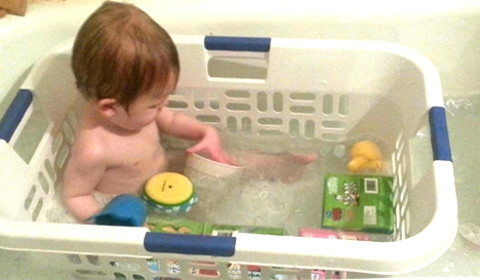Imagine this scenario:
Your baby has arrived a week ago and you are overwhelmed with responsibilities as a new mother. You are tired from the daily routine of diaper changing, breastfeeding and pumping (to increase your milk supply) through the day and wee hours in the night. It’s about 3am in the morning, and you’ve been trying to settle your crying baby for the past hour.

You tried waking your husband up to help but he is fast asleep and snoring away, tired from his late-night outing with his friends for the past three nights. You are very angry that he has been out so regularly partying and not around at home to help out with the baby. You are upset that he is out having fun as if nothing has changed, while you are now ‘stuck’ at home alone managing the crying baby on your own.
Does this sound too familiar to you?
As a couple starts out on their new parenthood journey, there will be conflicts, like the scenario mentioned. It is obvious that the wife in the scenario had expectations of her husband to stay at home to help out with the baby. But the husband didn’t know. Her husband probably didn’t expect that there was a need to make a change in his lifestyle and to help out more with the responsibilities at home.

She probably hoped that her husband would wake up to help with the baby when the baby cries in the middle of the night. But he didn’t know. He also probably had the expectations of her being the main carer of the baby and thus did not know how and if he should be involved.
Although many know the fact that parenthood is not an easy feat, yet many neglect the heart preparations one should do before the arrival of their baby. Like us, many were caught up in the excitement of preparing for the baby’s room – which is important, don’t get me wrong. But finding time to discuss the future together with your spouse will surely help strengthen your parenthood team (you and your spouse) and minimize conflicts in the parenting journey ahead.
1. Setting clear family values
Family values are rules or ideals, which a family shares for the common good of its members. Values give a family an overarching purpose and guide as to how each family member acts and behaves in different situations. It also unites the parents and the family, enriches and guards the intimacy of the family members. Positive family values could include kindness, mutual support, respect, sacrifice, hard work, fun, and service.
Each family’s set of values will be different from the next and will be shaped by things like education, religion, and family history. If you haven’t set family values between your husband and yourself, it will be a good time to do so before the arrival of your firstborn. If you have children and have not done so, it will also be good to start setting clear family values that you and your family can live by. You can also print out your family values and have it nicely framed in your house.
2. Setting clear expectations of each other
As you approach the day when you become parents, setting clear expectations of yourself and your spouse will help minimize conflicts that may happen during a crunch or stressful times. “What are some expectations you have of yourself as you take on the role of a mother and wife? What are some expectations you have of your spouse as he takes on the role of a father and your husband?”
You can make this sharing activity a little more enjoyable by taking time on your own to write down the expectations (of yourself and your spouse) then pass the list to each other to view and point out those that are similar and different. Then, take time to hear each other and communicate on the expectations. If the expectations set are too high, this will be a good time to adjust and align them.

Some expectations may include:
- Waking up to care for the baby when the baby cries in the middle of the night
- Taking on some baby duties on a daily basis
- Bringing the baby out for walks
- Going out for breakfast as a family every Saturday morning
- Family day is on Saturday
- Informing you 3 days in advance if there are plans to meet with his friends and ask if you if you can manage on your own that evening. Or work out a plan to get help when he is away.
- Spending time with the baby and you
3. Set out clear roles and responsibilities such as housework and caring for child

While discussing the expectations of each other, it will also be beneficial to talk about the expected responsibilities, who and how to manage them when the baby arrives. Like planning on the strategy for a football match, having a proper discussion on the roles and responsibilities of the players in the team will help the team play the game more effectively and to win the game. Similarly, your spouse and you are a team together. And your goal now is to ensure that baby is cared for, and that together you can ride through the adjustment period as new parents.
Below is an example of the division of responsibilities that my husband and I have set before the arrival of our first-born:
| My spouse | Me |
| Bath baby | Feed baby |
| Diaper changing when around | Diaper changing when father is not around |
| Help bottle feed baby two times a day – at the 7pm and 11pm timing | Pump milk |
| Cleaning of toilets | Vacuuming |
| Mopping | Laundry (wash, dry and fold) |
| Washing of dishes | Cooking of meals |
| – | Maintaining neatness of the household |
| – | Grocery shopping |
| – | Tracking of expenditure and income |
I remember that my husband suggested dividing the baby responsibilities at night during the first 3 months of our parenthood journey (before our baby slept through), so that each of us can have some proper sleep and rest. I would take on the feeding and diaper duties from 11pm to 3am while he rests and sleep, and then I will wake him up at 3am for him to take the shift from 3am to 7am.
4. Parenting styles

Setting consistent parenting styles to raise your child would definitely help minimize conflicts in your journey. It will also ensure that your child will not be confused by your different parenting values and styles.
Is your parenting style one that is going to be firm and authoritative – assertive, supportive but not intrusive and restrictive? Or will it be one that is established by rules and guidelines that your children are expected to follow? How will you ensure that both your parenting styles will be consistent so that your child will not be confused? Will you use a disciplinary rod like a ruler or stick in your journey? What are your thoughts on disciplining the child below one-year-old?
5. Communicate, communicate, communicate!

Lastly, it is of utmost importance that the husband and wife continue to communicate throughout the journey. Communication is a process, and learning that process brings couples closer. When a couple learns to communicate, they develop a uniquely shared language. Although effective communication is hardly a natural skill, researchers have demonstrated that the quality and quantity of communication improves a relationship.
Marital and parental communication need not be lengthy to produce success but having the existence of communication will increase feelings of ‘connectedness’. By doing so, it will help sustain your marriage even in the new parenthood journey.
Having effective communication will also minimize confusion between the spouses. Always state your thoughts as clearly, honestly, and positively as you can. Minimizing confusion increases relationship commitment, and commitment is directly related to relationship satisfaction.
By Yvonne Chee.
If you find this article useful, do click Like and Share at the bottom of the post, thank you.
Like what you read and want more? Receive our latest articles and giveaways when you sign up on our mailing list here.


























































Leave a Comment: